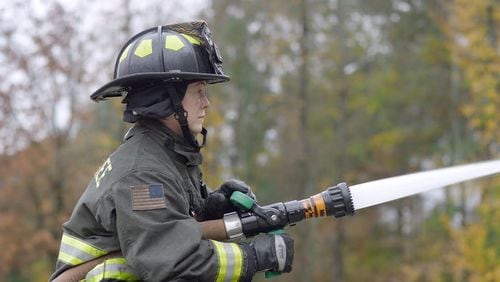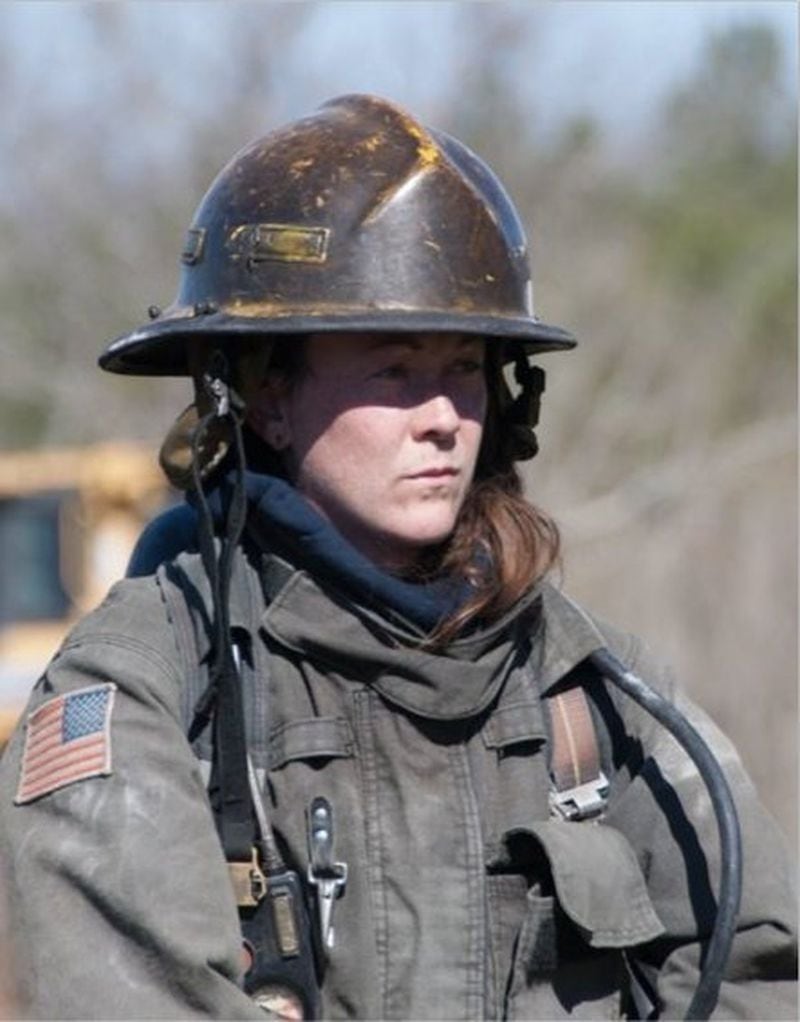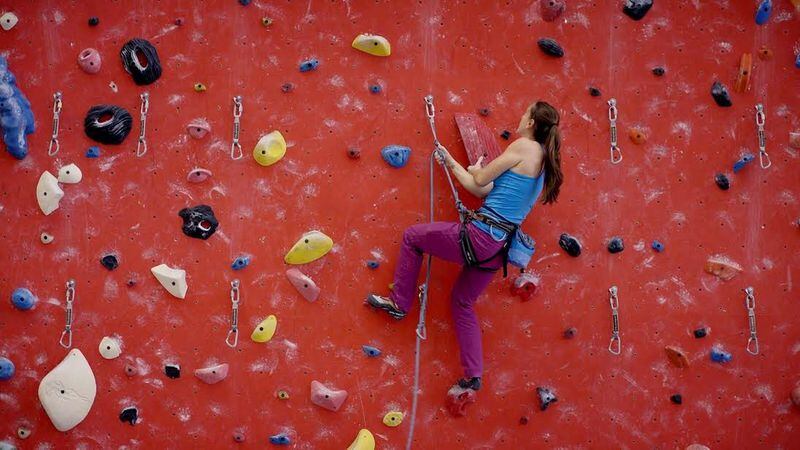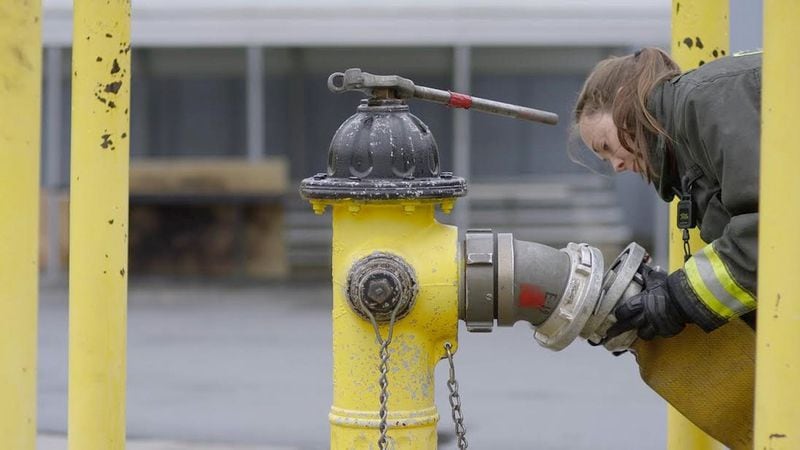A firefighter for three years as of this month, 29-year-old Grace Robertson, who works for Cherokee County Fire & Emergency Services, has already prepared herself for the worst-case scenario in her male-dominated profession.
"One of the biggest things from the F.L.A.M.E.S. (Firefighters Laboring and Mastering Essential Skills) creed that really spoke to me, toward the end of it, it says, 'On the plains of hesitation lie the blackened bones of countless millions, who at the dawn of victory, laid down to rest and resting they died,'" says Robertson. "You can't quit because when you quit, you die. And many firefighters have been in that situation where they have been just 10 feet from the door and have taken off their respirator and died. So this program is to really push firefighters to never give up. It doesn't matter how tired you are. You don't have time to rest."
Robertson recently completed the Georgia F.L.A.M.E.S. course, one of six women in Georgia to do so. “High-stress situations” coupled with “limited recuperation periods” prepare firefighters for what they may face in their careers. One of the first tasks is physical training, which includes jogging wearing “bunker gear” or personal protective equipment, which weighs 65 pounds, along with a respirator or self-contained breathing apparatus.
“The most intimidating person comes in,” says Robertson. “I guess they do research on us because they yell specific questions to people about their personal lives while making us do pushups and mountain climbers.”
Firefighters complete drills including being required to “quick dress” in bunker gear as they have to be ready for emergencies in less than two minutes, carrying a fellow firefighter in bunker gear up three flights of stairs and searching for nuts to fit into bolts in a completely dark room. All tasks are accomplished over a 48-hour period with little to no sleep. Out of 24 candidates in Robertson’s class, only 10 graduated, according to Robertson.
“They basically want to tear you down, sleep-deprive you and make you perform difficult skills in different scenarios,” explains Robertson, who is required to work 24-hour shifts. (She works for 24 hours and then she gets 48 hours off.)
As a woman, Robertson also had to contend with her monthly menstrual cycle complicated by the fact that she suffers from endometriosis, a condition which causes excessive bleeding and pain. “The day before, I started feeling cramps like my period was coming on. I was like, ‘Man, if my period starts, I might not able to go to this class,’” says Robertson about the F.L.A.M.E.S. course, which is not a requirement for Georgia firefighters. However, it can count toward required training hours, as well as be taken into account when a firefighter is up for promotion. “But when it started, I said, ‘I’m gonna go, and if it’s too much, I can always leave.’”
Since Robertson would be required to wear her bunker gear much of the time, she didn't want to use traditional menstrual tools like tampons. "There are a lot of carcinogens in your gear," says Robertson. "I bought a pair of Thinx panties (which can be used as an alternative) before and liked them. I didn't want to take tampons because if I kept tampons in my gear, smoke would be getting in them."
Despite unique challenges that women may face in firefighting, Robertson, who became interested in first responder work after taking a Wilderness First Responder course in California, has not been deterred. Robertson, a military brat, graduated from McIntosh High School in Fayette County and attended Georgia Southern University for a time. After returning to Atlanta, Robertson worked as an EMT (emergency medical technician) with Cobb County’s Metro Atlanta Ambulance Service. Through that job, she developed an interest in firefighting.
"I started asking around about being a firefighter, how is it being a woman and a firefighter. The male firefighters told me the only women who joined the fire department were sluts and lesbians, and they can't do the job," says Robertson of firefighting. Women make up 4.6 percent of that field in the United States, according to the National Fire Protection Association.
But Robertson, who loves “thrills and hard work,” has proved them wrong. “I can advance a 2 1/2-inch (hose)line. I can drag a full-grown male through a room while wearing gear and breathing compressed air. I can lift patients.” And being a woman has been an advantage. “We had a fire yesterday, and they put me up in the rafters because they were so close together and I was the only one of the guys who would fit. And on a medical side, being a female for sexual assault and rape cases where it’s good to have a female around, I feel like I definitely benefit the overall department. Like it’s not just a bunch of dudes.”
RELATED | See Robertson talk about going after a job as a firefighter
While accepted by her male co-workers, one did cross Robertson’s boundaries. “One of my co-workers, who I thought was a friend, I had fallen asleep on a couch and woke up to him putting his hands down my pants with his penis out.” Although she was initially unsure how to address the issue, her boyfriend, a Memphis, Tenn.-based firefighter, encouraged her to tell what happened. “When my chief heard about it, he was mad that it happened and asked for a full investigation. The county handled it pretty well.”
And Robertson hopes to be promoted to fire chief in the future. “Cherokee County has not had a female fire chief. The highest a female has been promoted to is lieutenant.” She also enjoys demonstrating that women can be firefighters in the community. “When we go to the grocery store and pick up food, a lot of moms will be there with their daughters, and they will be like, ‘Oh look, there’s a girl firefighter,’ and I will go up to them and tell them we’re hiring.”
Raised with three younger brothers, Robertson credits her mother, who home-schooled them, with inspiring her to challenge gender stereotypes. “Because of that, we were each other’s best friends and did all the same things like BMX biking, swimming, rock climbing and so on. … My mother never told me or made me feel like I had to participate in traditionally female activities. If my brothers could do it, I could do it.”
IN OTHER NEWS:









